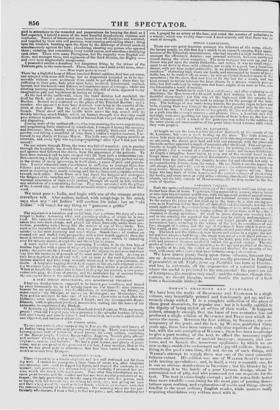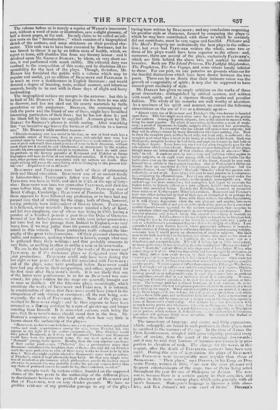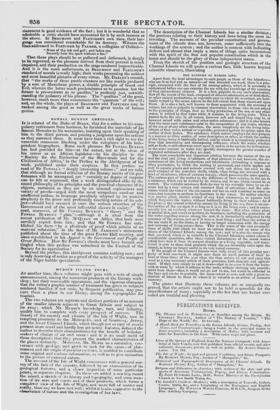MONON'S BEAUMONT AND r LETC 11 ER.
WE have here the works of IlitAustorip and PLETCHER in a single volume, very beautifully printed and handsomely got up, and ex- tremely cheap withal. It is a complete collection of the plays of those great dramatists, for popular use ; but it is hardly entitled to the dignity of being styled an edition of their works. It happens, indeed, strangely enough, that the lapse of two centuries has not produced a single edition of 13E.kumoyr and FLETenEtt which de. serves the name. Between the first edition, by Sittar.nr, the con. temporary of the poets, and the last, by Weamt, published thirty years ago, there have been various collective reprints of' the plays ; but, with the sole exception of WEarta's, there has been no attempt to give a pure reading of the text, to afford the necessary expla- nations and illustrations of ancient language, manners, and cus- toms, and to furnish the numerous appliances by which we are now-a-days enabled to understand and (Any old authors. Sunmear, living in the poet's own time, did not dream of Hach things, and %VEBER'S attempt to supply them was one of the most miserable failures extant. His edition was one of WALTER Scores memo- rable trading speculations, and, in itself; a very reasonable one, for it. was an obvious desideratum in literature ; but his blunder lay ire committing it to the hands of ;t poor fkrman drudge, whom he patronized out of' pity, and who possessed not one requisite fur the task. 'liter text is exceedingly corrupt ; and the notes little better
, than mere twaddle—consisting for the most part of prosing (hisser-
1 tationa upon nothing, and explanations of words and things already fittniliar to the most ordinary English reader, iv hike matters really requiring elucidation very seldom meet with it. The volume before us is merely a reprint of WEBER'S inaccurate text, without a word of note or illustration, save a slight glossary, of half a dozen pages, at the end. Its only claim to be called an edi- tion rests on the " Introduction ;" which consists of a biographical sketch of the authors, and some strictures on their poetical cha- racter. This task was to have been executed by Sourrusw, but he was forced to throw it up by an infirm state of health, which, we regret to learn, still disables him from any literary labour : and it devolved upon Mr. GEORGE DARLEY ; by whom, on very short no- tice, it was performed with much ability. his editorial duty was confined to the composition of this essay, and he disclaims all re- sponsibility for the text of the plays. Though, therefore, Mr. Moxosi has furnished the public with a volume which may be popular and useful, yet an edition of 13zArsioNT and FLETCHER is as much as ever a desideratum in English literature ; and would demand a degree of learning, taste, critical acumen, and laborious research, hardly to be met with in these days of slight and hasty bookmaking.
The biographical notices are meagre in the extreme : but this is no fault of Mr. DARLEY'S. He has given the few facts he was able to discover, and has not eked out his scanty materials by futile speculation or idle conjecture. SHIRLEY; the contemporary of both the poets and the friend of one of them, might have furnished interesting particulars of their lives; but he has not done it ; and the blank left by him cannot be supplied. A reason given by Mr. BARLEY for SHIRLEY'S silence is worth noting. After remarking that "an inventive age leaves the business of criticism to a barren one," Mr. DARLEY adds another reason- " Fireside-treachery was less venial in his time, or was at least made less a marketable article of literature, than in ours; rich-minded men were less swarmed upon by brain-suckers to qualify themselves as bookmakers; and per- sons of great note could then admit persons of none to their discottrse, without much dread lest it should be said (adulterated or attenuated) by the retailer, towards his own especial benefit except in reputation. I have no such cause for gratitude to the literary parasites of Beaumont and Fletcher as future biographers will have to those of our intellectual notables. If S:iirley he taci• turn, other persons who were acquainted with my authors are dumb. How shople a thing will prove the compilation of lives belonging to this present tell- tale 'era: usui est in ho nude."
BEAUMONT and FLETCHER were both of them of aristocratic birth and liberal education. BEAUMONT was of an ancient family in Leicestershire; FLETCHER'S lather was Bishop of London. Fermium was born in 1576, and died in 1625, at the age of forty- nine : Beaumoxl. was born ten years after FLETCHER, and died ten
years before him, at the age of twenty-nine. FLETCHER was of Benet College, Cambridge; BEAUMONT of' Pembroke. Neither of
them appears to have followed any profession' or to have had any pursuit save that of writing for the stage; both of them, however, !mina' probably been independent of literary labour. FLETCHER;
it is believed, never married : BEAUMONT married a lady of Kent,
and left two daughters, one of whom was livit.er in 1700, having a pension of a hundred pounds a year front the Duke of ORMOND. Several of her father's poems, we are told, were in her possession ; but were lost on her passage front Ireland to England,—no very
heavy loss, if we may judge from his poems still extant, and con-
tained in this volume. These particulars really exhaust the bio- graphy of the great twin-dramatists. Of their personal characters, habits, and manners' nothing whatever is known, except what may be gathered from their writings ; and that probably amounts to very little, as nothing is often so unlike a man as his own works.
We are in the habit of speaking of the works of BeAtaloyr and FLETCHER, as if the numerous plays so designated were their
joint productions. ileatektosT could only have been during the lust eight or ten years of his short litb associated with Ferreuea ; and of tlte plays, sonic were produced before Ilsaumovir could have had any share in their composition, and others appeared for the first time after BEAUMONT'S death. It is not likely that any of the latter were posthumous in so for as ItteteatoNT was con- cerned ; for plays written for the stage are generally brought out
as soon as finished. Of the fitly-two plays, accordingly, which constitute the works of BEA I'MONT and FLETCHER; it is inferred, by consideration of dates, that BEAUMONT could have joined in the composition of only sixteen or seventeen ; all the rest being, con- sequently, the work of Fix:rem:a alone. None of the plays are ascribed to Beau M. 'NI singly : and he thus appears to have been assumed as it literary assistant by a man of greater age and longer standing than himself: It is some what curious, such being the case, that Beauanoer's name should stand first in the firm. Mr. DARLEY'S conjectures On this head only show how very little is known about the authorship of the plays- " Beaumant, we find reason to believe, was :1 very 'trete-I:ions writer, published works, and made acquailitances among the is 5, betitre Pletcher did, who
appears in the light of a hoe ii it iompaiatively. Thus Fletcher would have joined Beaumont, as it were, not Beaunmat Fletcher: and Beaumont would have been the paramount name, the one most spoken of at the " Mermaid" among choice spirits. Besides, from the very superior excellence
of their carlier jointeeelys, e:c., a presumption arises that Beaumont eontributed the weightier share ef them ; else, why did not Fletcher reach the same pe&etion in same of those teeny u iuls we know to be by hint alone 11.1a also might explain whereti-v.. Beaumont 's name took pr:cedenee of Fletcher's, which it kept afterwards from habit. Or that very simple soils tutu of numberless phienomena, which philosophers ptii,ale themselves stupid otherwise to aCensint lin., may probably resolve the present enigma better than any ehain of profound t011 ss WC yoUld tie together—videlieet, aceideut." The attempts made by various critic's, founded on the supposed shares of the two poets in the authorship of the different p1s. to discriminate between the poetic:11 character of Hear mosT and that of FILTell Elt; rest Oil very slender grounds. We have no positive evidence of any particular passage in any of the plays " Almost every one of Beaumont and Fletcher's fifty-two dramas is founded upon Love. This fact might even alone serve for a gauge to mete the genius of our authors. Among all poetic subjects, love is the easiest to succeed with, being the most popular. To select it over-often, is therefore a mark of weak- ness; a proof ot impotence to handle subjects which interest less universally, enthusiastically. No dramatist who has a heart will eschew love-subjects; but they will be always chosen by many dramatisers who have nothing else. Now to tbrin the complete poet, neither heart only, nor head only, is sufficient : the complete puet must have a heart in his brain, or a brain in his heart. Such was Shakspeare, complete because he had both, and supreme because he had both to the highest degree. Love, however, must not (as often imagined) pass for the sole emotion which evinces heart. Shakspeare evinces throughout all his plays, though many are independent of that emotion altogether or almost—" Mac- beth,' to wit. A supreme poet, by native taste and ambition rather aspires to loftier subjects, as an eagle snare among cliffs and clouds nor builds like the turtle-dove even on the most beautiful tree of the forest. ;hough he may rock himself there awhile in the tannest branches. Out of Shakspeare's thirty-six dramas there are one-third docided love-plays—a due proportion : but his greater dramas, 'Lear," Hamlet," Maebelb,"Othello,' admit this passion sub- ordinately, or not at all. Love-plays will ever be most popular in a voluptuous age, evidencing its effeminateness. Pew at any other kind appeared under the Restoration, l'aigland's most dissolute, feehlesminded, contemptible acme Our author's age was more masculine ; but corruption had begun to enervate the higher ranks, to degrade gallant :rim into gallants-, knights into rapiered fops, barons into powdered beaux. Luckily the Rebellion occurred, to reconvert these minion, of Cytherea into Minerva's cavaliers. Beaumont sod Fletcher's taste was either debauched by that of their age, or debauched it, or 'perhaps the debauchment was reciprocal. Love, with these writers, too often degenerates, as it will always degenerate when the sole pleasure and employ, into mere sensuality. Their noblest and purest delineatian of the passion has a somewhat morbid character—an auroach to the modern sentimental, that exception to the aphorism which says nothing can be at once detestable and despicable. But however platonic and reined. surely this eternal feres/ollying is beneath an exalted. genius. Achilles does 1:4.,t always delight to luxuriate on his press-bed, tottabing his lyre to the charms of his mistress, tolehing both with a palm as soft as a hairdresser's pamatumed lingers; this is the delight of a Paris. I ant persuaded that even woman herself, whose paminount influence it bespeaks, whose vanities it flatters whom it enthrones idol-like for never-ceasing worship, —woman herself woold prefer an alternation of manlier subjects. She likes man in the ball, and better in the bower, but admires him more ou the steed or the rostrum : as a soldier, ac a logislat.r, she advir,:s huitti ultast ; not as a chamberer, and a carpet-knight. Ni" will I believe her fl) 1:ttle intellectual, so unemaprehenetve of intepleetea":ty. th:It Ale would prize "Ro:neo and Juliet" al■Jve " Macbeth," end set Herr:, 4., whet sings ever of Le.o. 1,efore Milton, who scarce sings of it at all. Our two dramatists, and 1-n-e-tno:.,;,]-:, by profession, do any thing ratIE r than exalt woman 'oy t I; o',, aim -a W hen the ' tender pa5,1 qt. I eeomes haelenied, ;.; 10F:es in T, : when made too
common a salei, et. it declines i.ito Eomewhat war,. Ih-m maudlin
uambv-pamlpy. M4nnan is pa fet :1 ratlur than caressed by r;a. Wycherley, and N'anbrugh ; s:t up rather as a butt for compliments by t: .4.teve, Dryden, Sc., than a shrine ict de..psmurmured vows, prayers. mid praises. Move- :nal; ing prevail as an indispensable rule. it scan d'eg, aerates into an artificial
accompaslomeit—all that is not lactitions abaat it is sensitality, Womar.,
throughout 1.1..tcher's comedies. is treated too inueli as a fair animal, or little more. The homage paid her is alm4,st beartb:ss. at least soulless: she is de- graded into a mere object of voluptuous pur:mit lore to be coursed, or a trout
to be tickled, 1;q. supper. When our 'playwright's lovers are married, it cannot netke them happy, so it does not us ; when tltey are separated front each other,
it gives them little pain, and ns. therefore little intereit. Love is represented as a nobler passion, and by eonse,lueeee a deeper one, in the trag.Ali..s, etrcially those of Beaumont's cotitthership. Oar slat hors Itae,, not deve:ord tt with as much native 'unity and wholesome intensity as Shek suave has done; but they bestowed a grace opon it. a soft fodoratiess, a runty r- like or Magdalene air at pathos, which renders it, I should say. alswe ideal than his delineation?, and others will perltaps think iii re attractive. Ile paints it like Ratfacl or Perugino; they, like Guido.- The immodesty of language. and coarse and filthy expressions. which, unhappily, at found in such profusion in these plays, must be ascribed to the manners of the age. In the time of .1_■M ES the First, licentiousness, mingled with eross vulearity. pervaded every class of society, from the court oh' the sovereieu downwards and it may be said that lowness of illatilICTS was iavers..ly in pro- portion to elevation of rank. The far the worse, in this respect, after the death of ELIZABETH, scents to have been very rapid. During this :era of degradation, the plays of 11E ‘t, movr and F Li: ru urn were incomparably more popular than those ot Sim tK$I'u:utu. " Their plays," says Davos:N, in his Essay on Dra- matic Poetry, written in 166tt. are now the most pleasant and frequent entertaiuments of the stage, two of theirs being acted throughout the year for one of Shakspere or Jonson. The rea- son is. because there is a certain gat ety in their eonwdies, and pathos in their more serious plays, e hich suits generally with all men's humour. Shakspere's I:mail:Igo is likewise a little obso- lete, and Ben Jonson's wit come e'itirt of theirs." DEVIMZCS having been written by Iimusioyr ; and any conclusions respecting his peculiar style or character, formed by comparing the plays to which he may have contributed with those to which he certainly did not contribute, must be very vague and fanciful. Philaster and The Maid's Tragedy are undoubtedly the best plays in the collec- tion; but even had FLETCHER written the whole, some two or three of his plays would have been superior to the others : and, moreover, there are several of the plays, exclusively FLETCHER'S; which are little behind the above two, and marked by similar beauties. Such are The Island Princess, The Faithful Shepherdess, The Prophetess, The Sea Voyage, and some others hardly inferior to these. For our part, we can perceive no grounds whatever for the fanciful distinctions which have been drawn between the two poets. There can be no doubt that their intimate union was the growth of congeniality of spirit ; it may also be supposed to have caused great similarity of style. Mr. DARLEY has given an ample criticism on the works of these great dramatists ; distinguished by critical acumen, and written with much spirit, and in a vigorous though quaint and peculiar fashion. The whole of his remarks are well worthy of attention. As a specimen of his spirit and manner, we extract the following observations on the use of lore as a dramatic agent- statement is good evidence of the fact ; but it is wonderful that so admirable a critic should have accounted for it by such reasons as the above. In BEAUMONT and FLETCHER'S own time, their lan- eage was considered remarkable for its decency. Witness the lines addressed to FLETCHER by PALMER, a collegiate of Oxford—
None of thy ink and gall; and ladies can Securely hear the sport without a fan."
That these plays should be so polluted and deformed, is deeply to be regretted, as the pleasure derived from their perusal is much impaired, and their production on the stage rendered impracticable. And it is the more unfortunate, as BEAUMONT and FLETCHER'S standard of morals is really high; their works presenting the noblest and most beautiful pictures of every virtue. Mr. DARLEY'S remark, that "the works of these poetic creators are like worlds produced by a sort of Manichean power, a double principle of Good and Evil, wherein the latter much predominates as to quantam but the former is pre-eminent as to qualitas," is perfectly just, notwith- standing the pedantry of his phrase. The " qualitas " of the good, however, much more than counteracts the "quantum" of the evil; and, on the whole, the plays of BEAUMONT and FLETCHER may be ranked among the good as well as the great works of human genius.




























 Previous page
Previous page